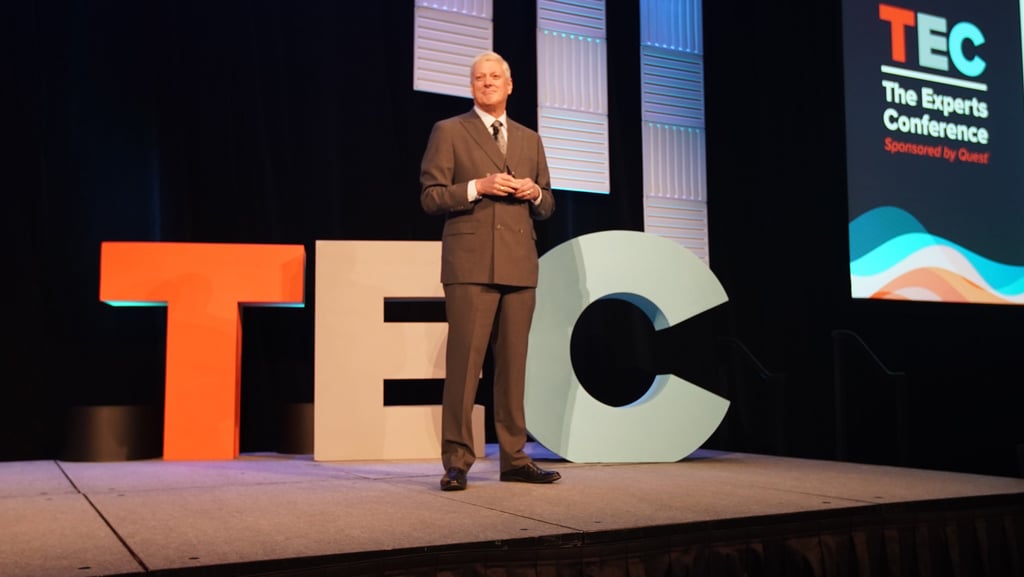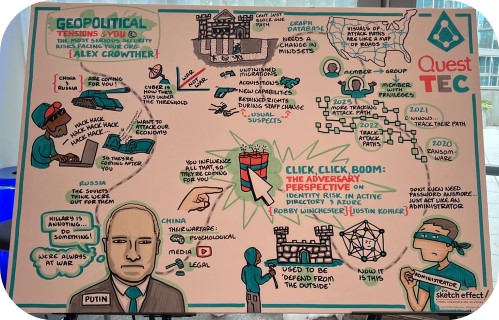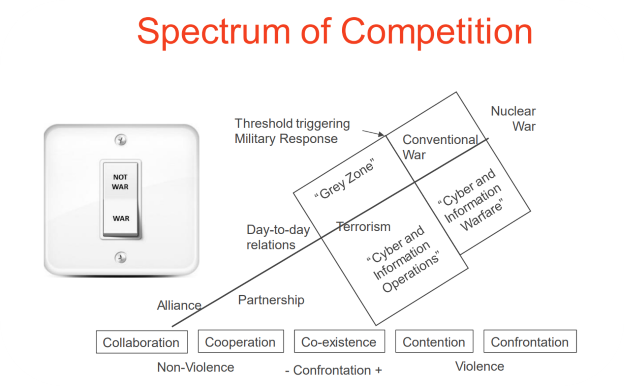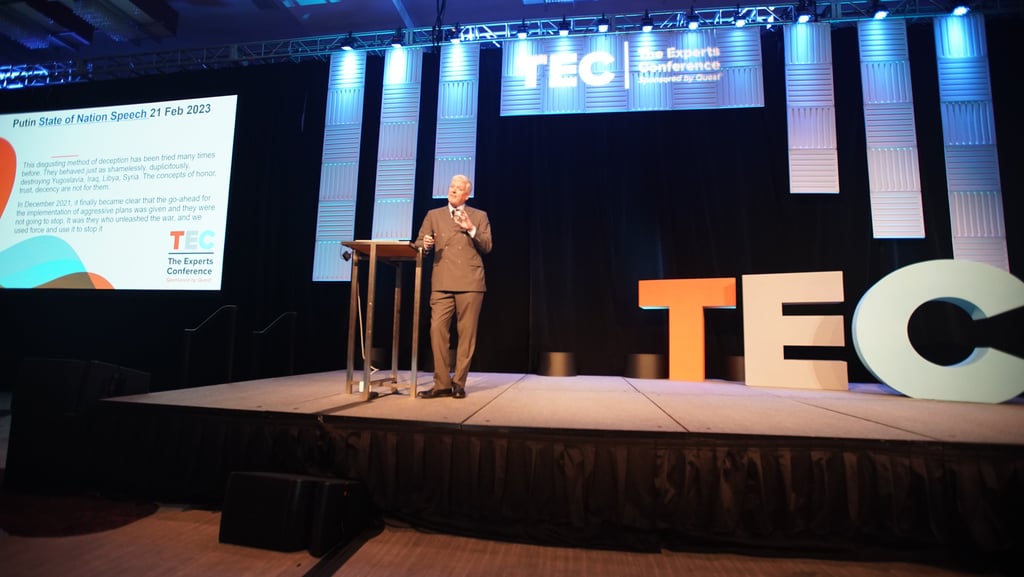Recap of The Experts Conference 2023: Insights from Alex Crowther's Keynote
Dr. Alex Crowther, a national security expert, spoke at The Experts Conference 2023 on the threats from nation-state adversaries. He discussed how China, Russia, Iran, and North Korea are using cyber warfare, propaganda, and legal tactics to undermine the U.S. and its allies. He also explained the spectrum of competition and conflict between countries, and China's concept of "Unrestricted Warfare" and "The Three Warfares". He highlighted the findings of the 2023 Annual Threat Assessment of the U.S. Intelligence Community, which emphasized the persistent threats from these adversaries.
SECURITY
Richard Dean
9/25/20235 min read


It was an absolute privilege as co-host of The Experts Conference this year in Atlanta to introduce the first keynote given by eminent G. Alexander Crowther, Ph.D., a renowned strategist, cyber policy specialist, and international affairs professional.
As we warmly welcomed Alex Crowther to the stage, it became apparent that the audience was in for an enlightening experience, one that might challenge preconceived notions, beliefs, and sensibilities. His wealth of experience promises a message that is clear, concise, and unapologetic in its honesty. Dr Crowther’s expertise spans the intricate terrain of the Cold War, the Post-Cold War era, and the ever-evolving challenges of the post-9/11 world.
Keynote: Geopolitical Tensions and You
In his riveting keynote session titled "Geopolitical Tensions and You: The Most Serious Security Risks Facing Your Organization," Alex wasted no time in diving into the heart of the matter. He illuminated the audience on the critical issue of nation-state adversaries infiltrating vital infrastructure worldwide, posing risks to power grids, pipelines, and transportation systems.
This echoes the message from Black Hat 2023 from keynote speakers, Jen Easterly and Victor Zhora highlighted the importance of resilience in the face of cyber threats by adversaries of the United States, Europe and other western allies. They emphasized that strong cyber defenses alone are not enough. The speakers repeatedly emphasized the need for organizations to build resilience. This means having the ability to continue operating critical systems even if they are disrupted by an attack. This is especially important considering the increasing sophistication and frequency of cyberattacks.
As this infographic (see figure 1), created by “The Sketch Effect”, so brilliantly illustrates, is that China and Russia (and other regional powers) are targeting key infrastructure within many sectors including economic, energy, and transportation systems to negatively impact western economies because foreign enemies recognize the western economy is the greatest strength next to diplomatic, military, and cyber. To stay under the threshold of a hot war, they prefer tactics such as cyber warfare, legacy and new media propaganda, psychological infiltration using similar Cold War era tactics (of divide and conquer using race and culture) and any legal means possible to disrupt, influence or diminish western systems and supply chains.


A New Cold War and Puzzling Questions
In a thought-provoking moment, Crowther presented us with a compelling question: Why do adversaries like Russia, China, Iran, and North Korea persist in attacking assets, even when confronted with the overwhelming might of the U.S. military? He skillfully drew parallels to a new cold war era, connecting global events to the intricate tapestry of security and regulatory challenges faced by both private and public organizations.
Consider, for instance, the striking words of Russian Federation President Vladimir Putin during his 2021 State of the Nation address: "This disgusting method of deception has been tried many times before. They behaved just as shamelessly, duplicitously, destroying Yugoslavia, Iraq, Libya, Syria. The concepts of honor, trust, decency are not for them. In December 2021, it finally became clear that the go-ahead for the implementation of aggressive plans was given, and they were not going to stop. It was they who unleashed the war, and we used force to stop it."
This quote provides a stark insight into the perspective of the Russian Federation's leadership, which believes that NATO is targeting Russia, prompting Russia to defend itself through any means possible, short of initiating a full-scale war. In the following section, we will delve deeper into Dr. Crowther's keynote, exploring the dynamics of this complex situation.
Navigating the Spectrum of Competition
With eloquence, Crowther guided us through the spectrum of competition (see figure 2) with fluency, explaining the comprehensive range from cooperation and collaboration to contention and confrontation. He underscored how this spectrum influences everything from day-to-day relations to the triggers for military responses.


China's "Unrestricted Warfare" and "The Three Warfares"
During his session, Dr. Crowther placed a spotlight on China's strategic approach, characterized by their resolve to resist Western influence and preserve their sovereignty. This approach was eloquently summarized by Crowther with a quote from President Xi at the 2018 National Propaganda and Ideological Work Conference: "We must be acutely aware that Western hostile forces have unswervingly attempted to Westernize, divide, and weaken China."
One of the most captivating aspects of Dr. Crowther's talk was his exploration of China's concept of "Unrestricted Warfare." He elucidated how this strategy encourages the utilization of all available means, encompassing both armed and non-armed methods, to advance national interests. Furthermore, he provided valuable insights into China's "Three Warfares" strategy, which includes Psychological Warfare, Media Warfare, and Legal Warfare.
These strategic elements paint a comprehensive picture of China's efforts to safeguard its interests and maintain its position on the global stage. Crowther's expert analysis allowed us to gain a deeper understanding of the multifaceted strategies employed by China in an increasingly complicated political and economic landscape since COVID 19.
Understanding the Current Threat Landscape
“The era of nation-state competition and conflict has not been relegated to the past but instead has emerged as a defining characteristic of the current era.”
In conclusion, Crowther brought our attention to the sobering findings of the 2023 Annual Threat Assessment of the U.S. Intelligence Community. He emphasized the persistent threats posed by nation states such as China, Russia, North Korea, and Iran, particularly in technological competition, cyber espionage, and foreign influence with this quote from the annual assessment, “The era of nation-state completion and conflict has not been relegated to the past but instead has emerged as a defining characteristic of the current era”.
Here are some key takeaways from the keynote and annual threat assessment:
China poses a significant threat to U.S. technological competitiveness by targeting critical sectors and proprietary technology from U.S. and allied companies.
China continues to pursue foreign science and technology through foreign collaborations, investments, talent recruitment, and cyber espionage, aiming to acquire and transfer technical knowledge.
China represents a prominent and persistent cyber espionage threat to both U.S. government and private-sector networks.
Russia employs a diverse toolkit, including military, security, malign influence, cyber capabilities, and intelligence tools, to advance its interests and undermine those of the United States and its allies.
Russia poses a substantial foreign influence threat, utilizing intelligence services, proxies, and a wide range of influence tactics to divide Western alliances, diminish U.S. global influence, sow discord within the United States, and influence U.S. decision-making and elections.
Navigating a Complex World
In retrospect, The Experts Conference 2023 was profoundly enriched by the presence and expertise of Dr. Alex Crowther. His session not only imparted knowledge but also spurred us to engage in critical thinking and discussions afterwards about the intricate geopolitical tensions shaping our world.
For Chief Information Security Officers (CISOs) overseeing critical infrastructure, his insights serve as a clarion call to gain a deeper understanding of the security landscape. It's a reminder to renew commitments and allocate budgets to maintain vigilance in our ever-evolving environment.
As I observed Alex Crowther deliver his keynote, it prompted a reflective notion: What if, back when the Berlin Wall fell and the need for collaboration arose, Russia and the United States had joined forces as NATO partners? It might have paved the way for a world that looks entirely different today. It's admittedly an optimistic and visionary thought, but one worth contemplating for future leaders, offering a glimpse of possibilities for generations to come.




